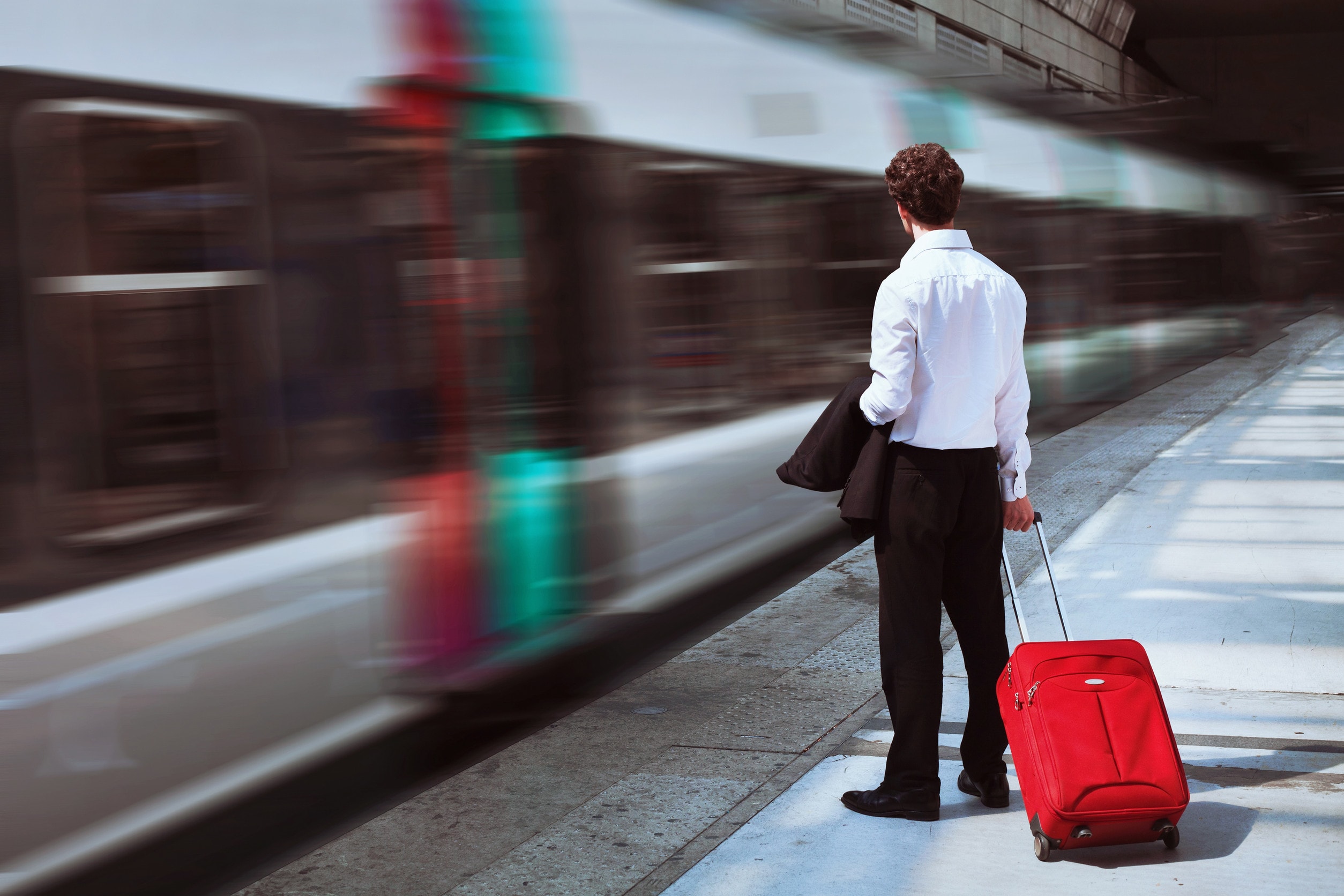Last updated 16th December 2025. Train accident claims allow passengers, railway workers, and members of the public to claim compensation if they are injured in a train or a station accident caused by someone else’s negligent actions, such as a train operator or station manager. These claims can cover physical and psychological pain and suffering, plus associated financial losses such as medical treatment costs and loss of earnings, and must usually be started within 3 years of the accident.
Our panel of experienced personal injury solicitors can handle train accident claims on a No Win No Fee basis, meaning that you can receive legal help and guidance before and during the claims process without paying a penny for your solicitor’s work. There are also no solicitor fees to pay if your claim is unsuccessful.
What You Need To Know
- Common train accident injuries include fractures, burns, head trauma, and psychological damage.
- Train operators and station managers may be held responsible for train accident injuries.
- Train accident claims can be made by passengers, railway employees, and members of the public.
- All train accident claims need to be supported by a strong body of evidence, such as CCTV footage from the train station.
- According to the Office of Rail and Road (ORR), there were 11,472 total injuries in 2024-25 to mainline workforce and non-workforce (passenger or public) across all Great British rail networks.
Contact Our Advisors
For a no-obligation consultation to see if you can get started with claiming compensation, contact our team of friendly advisors today.
Start Your No Win No Fee Claim
Jump To A Section
- Can I Make A Train Accident Claim?
- What Are Some Common Train Accidents?
- What Injuries Are Covered In Train Accident Claims?
- How Much Compensation Could I Get After A Train Injury?
- Is There A Train Accident Time Limit?
- Will I Need Evidence To Support A Train Injury Claim?
- What Can Legal Helpline Do For Me?
- Train Accident Claims FAQs
- Learn More
Can I Make A Train Accident Claim?
You may be eligible to make a train accident claim if you can demonstrate the following:
- At the time of your injury, you were owed a duty of care by a third party, such as a train operator
- That party breached their duty in some way
- The breach directly resulted in you sustaining injuries
The duty of care in a train accident compensation claim refers to the obligation held by responsible parties like train companies and operators to protect the safety and wellbeing of passengers, visitors, and employees. This duty of care is set out by various pieces of legislation, which we’ll discuss next.
Who Would Be Responsible For A Train Accident?
Ultimately, who is responsible for a train accident will depend on the circumstances of what happened. For example, a train company may breach their duty of care by neglecting regular maintenance schedules or failing to fix a malfunctioning door that they had known for some time to be dangerously faulty. If that failure to meet this duty causes you to suffer crush injuries or other kinds of harm, you may have grounds to make a claim for compensation.
Different types of legislation may apply depending on your particular situation:
- Occupiers’ Liability Act 1957: Under this act, those in control of a public space (referred to as ‘occupiers’) have a duty to take practical measures to ensure the reasonable safety of visitors while they are using their premises or services. That might include conducting regular inspections or using warning signs to highlight potential hazards.
- Health and Safety at Work etc. Act 1974 (HASAWA): Establishes the obligations that employees have to their workforce. This act requires employees, such as train companies, to take reasonable steps to protect the health, wellbeing, and safety of workers. For instance, employers could ensure workers are appropriately trained and have access to suitable personal protective equipment (PPE).
- The Railways and Other Guided Transport Systems (Safety) Regulations 2006 (ROGS): Per ROGS, operators are required to maintain safety management systems to certain standards. They must also have a safety certificate to operate on the mainline railway, conduct risk assessments, and produce an annual safety report. ROGs also establishes a duty of care for ‘infrastructure managers.’
- The Rail Passengers’ Rights and Obligations Regulations 2010 (PRO): These regulations define a set of minimum standards outlining both the rights of passengers and the responsibilities that operators must uphold.
Can I Claim If I Was Injured At The Train Station?
Yes, you may be able to make a claim if you were injured in a train station accident that was not your fault. For instance, you may have a valid case if you slip and fall on a wet floor that hasn’t been marked with warning signs. Of course, train station accident claims can cover a wide range of other scenarios, including poorly maintained escalators, inadequate or broken lighting, and uneven surfaces. Liability will typically lie with the company or organisation responsible for maintaining the station.
What About An Accident That Happened On The Train Platform?
You might also have grounds to claim compensation if you were injured in an accident on a train platform. They are common sites of injury, especially if regular maintenance, inspections, and risk assessments have been neglected. That can lead to serious disrepair (like cracked or uneven surfaces), absent signage, and unattended (and unmarked) tripping hazards. A train company might be liable if, for example, they had delayed timely repairs to a loose tile, causing you to trip and break your foot.
I Had An Accident Within One Of The Station’s Facilities. Can I Claim?
Provided you meet the eligibility criteria discussed earlier, you could be able to claim if you are injured in an accident at a facility within a train station, like a shop or café. However, liability may fall to the business operating that part of the station. Say you slipped on an unmarked spill in a coffee shop or were burned by unsafe equipment in a takeaway kiosk. In such circumstances, the business might be held responsible for your injuries.
What Are Some Common Train Accidents?
Below, you can find some of the more common causes of train accidents, together with scenarios that might lead to a valid claim:
- Slips or trips due to spills, broken flooring, or icy platforms – A train station fails to clear snow and ice from platforms despite having a reasonable amount of time to prepare for the bad weather. As a result, you slip and break your leg while heading towards your train. Similarly, you might suffer fractures or other injuries if you slip on a spill that staff had left unattended without placing any warning signs.
- Falls from damaged train steps or faulty handrails – A lack of regular maintenance leads to train steps being left in serious disrepair, resulting in you falling and dislocating your shoulder while exiting at a station.
- Crush injuries from defective or premature door closures – Staff fail to conduct routine inspections and maintenance on a train’s doors, leading to a malfunction that leaves you with severe crush injuries to your arm.
- Driver error or equipment failure – These serious accidents often involve major failures in operational procedures, such as speeding, lack of maintenance, or inadequate staff training. For instance, you might suffer multiple injuries if you fall from a train because a driver starts leaving the platform before sufficient warning is given to passengers.
Whether or not you have had a similar experience, please reach out to our advisory team to see if you might be eligible to make a train accident compensation claim. Our advice services are live 24/7, so you’ll always get a quick response to your queries.
What Injuries Are Covered In Train Accident Claims?
Train accident claims can cover a wide range of injuries. These injuries might include:
- Head and brain injuries
- Spinal injuries, including paralysis
- Fractures and dislocations
- Lacerations and soft tissue damage
- Crush injuries from doors or seats
- Electrical burns or shocks
These injuries may result in long-term disability, chronic pain, or the need for rehabilitation. No matter whether you think your injuries are minor or major, you may be able to claim if they happened in an accident that wasn’t your fault. Speak to our advisors to learn more about train accident claims and get a free, no-obligation case assessment.
How Much Compensation Could I Get After A Train Injury?
The amount of train accident compensation you might get will depend on your claim’s individual circumstances. In personal injury claims, compensation can be divided into general and special damages. The former compensates for the pain and suffering caused by your injuries, while special damages can help you recoup associated financial losses. General damages cover both the physical and psychological impact, as well as how your injuries affect your quality of life (termed a loss of amenity). For instance, if you suffer a spinal injury that prevents you from returning to work or enjoying hobbies you once did, general damages aim to reflect these non-financial losses.
Many factors will be considered when calculating general damages, such as how severe your injuries are and whether they have led to permanent disability. Solicitors may use the Judicial College Guidelines (JCG) to guide their assessment of general damages. This document publishes guideline compensation brackets for a range of injuries and conditions, based on type and severity.
Below, you can see some of these brackets. Please keep in mind that these are only guidelines, and the first entry in this table hasn’t been taken from the JCG.
| Injury | Compensation | Notes |
|---|---|---|
| Multiple Severe Injuries and Financial Losses | Up to £1,000,000+ | The combined effects of multiple severe injuries caused by a train accident alongside financial losses, including lost earnings and the cost of home help. |
| Very Severe Brain Damage | £344,150 to £493,000 | At the top end of bracket, there may be some ability to follow basic commands However, there will be little to no evidence of remaining communication function or meaningful environment response. The claimant will also need full-time nursing care. |
| Moderate Brain Damage (i) | £183,190 to £267,340 | In this bracket, the claimant will show a moderate to severe intellectual deficit, as well as a change in their personality and an effect on their speech and senses. |
| Moderate Pelvis/Hip Injuries (i) | £32,450 to £47,810 | This bracket covers injuries that are significant, but whatever permanent disability is won't be considered major. Any future risks will also not be deemed great. |
| Moderate Back Injuries (ii) | £15,260 to £33,880 | Can include disturbed ligaments and muscles, as well as soft tissue injuries that accelerate and/or worsen pre-existing back conditions. |
| Moderate (ii) Neck Injuries | £16,770 to £30,500 | This bracket contains wrenching-type and soft-tissue injuries. Symptoms might feature limited movement, stiffness, and recurring or permanent pain. |
| Moderate Shoulder Injuries | £9,630 to £15,580 | Frozen shoulder symptoms that last for about 2 years, including discomfort and limited movement. |
| Moderate Foot Injuries | £16,770 to £30,500 | Permanent deformity and ongoing symptoms caused by displaced metatarsal fractures. |
| Wrist Injuries c) | £15,370 to £29,900 | Less severe wrist injuries that still result in some kind of permanent disability, such as persistent pain. |
| Simple Fracture of a Tibia/Femur With No Damage to Articular Surfaces | £11,120 to £17,180 | The fracture will not cause any articular damage. |
Start Your No Win No Fee Claim
Claiming Special Damages
Special damages are designed to reimburse you for financial losses directly resulting from the injury. For instance, you could claim for:
- Lost earnings due to time off work, as well as future loss of income
- Medical expenses for private treatments and rehabilitation
- Travel costs related to attending medical appointments
- Any care or assistance you’ve needed
- Adaptations to your home or vehicle to improve accessibility
While special damages can vary significantly, you will always need to provide evidence to prove your losses. So, try to keep hold of documentation like payslips and bank statements to support your claim.
If you’d like to learn more about compensation in train accident claims, contact our team of advisors today. They can provide guidance tailored to your situation and offer a free case assessment.
Is There A Train Accident Time Limit?
Yes, under the Limitation Act 1980, you have 3 years to start a train accident claim, typically dated to when the incident occurred. It’s important to note that this is not the time limit for completing the claim, but for beginning the process of pursuing compensation.
There are exceptions where the time limit is paused when an individual cannot make a claim for themselves:
- Children: For a minor, the 3-year limit doesn’t begin until their 18th birthday. They, therefore, have until 21 to start their personal injury claim.
- Limited mental capacity: Time limits are paused indefinitely for anyone who cannot manage their own affairs. If they regain mental capacity, the 3-year limit will begin from the date of recovery.
In both cases, it’s possible for individuals from these groups to pursue compensation while time limits are on hold. In order to do so, they would be represented by a litigation friend, who can claim on their behalf and perform various duties related to the case. Any eligible adult can fill this role, but it’s often assumed by loved ones and solicitors.
If you’re unsure whether you have enough time to claim, don’t delay reaching out to our advisory team. They can assess your case and provide you with further guidance.
Will I Need Evidence To Support A Train Injury Claim?
Yes, you will need evidence to support your train injury compensation claim. This may include:
- Medical records from hospitals or your GP
- Accident report logs
- Footage from station or train CCTVs
- Photos of visible injuries or of the location where the accident happened
- Up-to-date contact details for potential eyewitnesses, such as family, passengers, or staff. Those details can be given to a solicitor, who can take statements for your case
Our panel of solicitors know exactly how to obtain and piece together evidence. So, if you decide to work with one of them to make a claim, you’ll get help from the outset with building a strong case. You can find out more about their work and evidence in general by speaking to an advisor.
What Can Legal Helpline Do For Me?
Legal Helpline’s advisory team can provide you with a free, no-obligation consultation to assess your case and see if you can claim. If eligible, they can connect you with one of the dedicated personal injury solicitors making up our panel. Here’s how one of these expert professionals can help you:
- Support you in collecting evidence and starting the claims process
- Offer guidance tailored to your individual circumstances
- Expertly negotiate with other parties to secure compensation on your behalf
- Put you in touch with specialists like physiotherapists to support your recovery
- Provide regular updates so you always know what’s happening with your claim
Our panel of solicitors offer all their services under a Conditional Fee Agreement (CFAs), a type of No Win No Fee contract. With a CFA, you won’t need to pay any upfront solicitor fees to get started with your claim. You also won’t deal with any hidden or additional solicitor fees appearing during the claims process. If your claim is unsuccessful, you won’t pay any solicitor fees at all.
Under a CFA, you do pay a success fee to your solicitor if you win. It’s payment for all the work done on your case and comes out of your compensation. However, this small fee is agreed in advance, and the percentage that can be taken is capped, so there are no surprises.
Contact Our Advisors
Our advisors work 24/7 to make the process of starting a claim as smooth and stress-free as possible, so please don’t hesitate to get in touch. Whether you suffered injuries on a train or a minor fall at a station, they’re here to help you get the answers you want and offer a free, no-obligation consultation. You can reach out through the details provided below:
- Call us on 0333 000 0729
- Use the live chat feature
- Contact us online
Train Accident Claims FAQs
Here are some commonly asked questions, with answers, regarding train accident claims:
Can Visitors Or Tourists Make Train Accident Claims?
Yes, non-UK residents that were injured in a train or at a station in the UK due to someone else’s negligent actions are eligible to claim compensation.
What If The Accident Was Caused By Overcrowding?
Yes, you can absolutely make a train accident claim due to overcrowding on a train or at a station if it causes you injury, as operators have a duty to keep you safe.
Overcrowding due to unsafe boarding conditions, lack of crowd control, or jostling can lead to falls, being hit by objects, and crushing injuries.
Can I Claim For Psychological Injuries After A Train Accident?
Yes, you can claim for psychological injuries after a train accident (such as anxiety or PTSD) after a train accident that wasn’t your fault.
One of the specialist solicitors from our panel can help you prove how negligent actions caused you mental trauma and how it has impacted your work and social life.
What Happens If Multiple Passengers Are Injured?
If multiple passengers are injured in a train/train station accident, each person can make a personal injury claim, as long as negligence occurred.
Will Making A Claim Affect My Rail Travel Or Ticket Rights?
No, making a train accident claim shouldn’t affect your basic rail travel or ticket rights as a passenger.
Do Train Accident Claims Go To Court?
In the majority of cases, train accident claims don’t go to court. This is because most personal injury claims are settled without court proceedings.
In the unlikely event that your train accident claim is sent to court, a solicitor from our panel can represent you and be there by your side throughout the whole process.
Learn More
For more information on making a public liability claim:
- Learn how to make a claim against the council
- Find out how to make a shopping centre accident claim
- Get help making a claim if you were injured by an automatic door
Or, for further resources:
- Get information on Network Rail from GOV.UK
- Learn how to request CCTV footage of yourself
- Find out about first aid from the NHS
Thank you for reading our guide on train accident claims.
Author
-
Tracy Chick is a dedicated and expert Road Traffic Accident lawyer, holding a prestigious MASS Diploma in her field. When she's not immersed in the complexities of legal cases, Tracy loves to be outdoors, particularly enjoying any kind of water-related activity.
View all posts Road Traffic Accidents Lawyer






